2019 浙江省台州市中考英语真题及答案
答题时, 请注意以下几点:
1. 全卷共 10 页。分 120 分。考试时间 100 分钟。
2. 答案必须写在答题纸相应的位置上, 写在试题、草稿纸上无效。
3. 答题前, 请认真阅读答题纸上的“注意事项”、按規定答题。
卷一
说明: 本共三大题, 45 小题, 分 70 分。
第一部分听力部分
听力(本题有 15 小題, 第一节每小题 1 分, 第二、三节每小题 2 分: 共计 25 分)
第一节: 听小对话, 从题中所给的 A、B、C 三个选项中选出最佳选项, 回答问题。
1. What’s the weather like now?
A. Sunny
B. Windy
C. Rainy
2. Who has an English-Chinese dictionary?
A. Mike
B. Tina
C. Henry
3. Where is Mary?
A. At the park
B. At the cinema
C. At the library
4. How long is the museum open on weekdays?
A. 5 hours
B. 7 hours
C. 9 hour
5. What does the woman mean?
A. It’s too far to go to Paris
B. It’s a waste of time travelling to Paris
C. She supports the man in travelling to Paris.
第二节: 听较长对话, 从题中所给的 A、B、C 三个选项中选出最佳选项, 回答问题。
听下面一段较长对话, 回答第 6、7 两个小题
6. Why does the man like his job?
A. Because he thinks it is a challenging job.
B. Because he likes travelling around the world.
C. Because he likes teaching history in the university.
7. What does the woman do?
�
A. A tour guide.
B. A history teacher.
C. A university student.
听下面一段较长对话, 回答第 8~10 三个小题。
8. What is wrong with the woman?
A. She has a fever
B. She has a headache
C. She has a sleeping problem.
9. What did the woman do last night?
A. She went to bed early.
B. She attended a party.
C. She prepared for a meeting.
10. What does the man ask the woman to do?
A. Have a rest.
B. Take some medicine.
C. Change the job.
第三节: 听独白, 从题中所给的 A、B、C 三个选项中选出最佳选项, 回答问题
11. Why will the speaker go to London?
A. To visit her uncle.
B. To watch an art show.
C. To celebrate her dad’s birthday.
12. How will they go to London?
A. By air.
B. By bus.
C. By train.
13. Where are they going on Friday afternoon?
A. London Bridge.
B. The Design Muscum.
C. The London Eye.
14. When are they going to Harrod’s?
A. On Friday.
B. On Saturday.
C. On Sunday.
15. What does the speaker probably think of the coming vacation?
A. Boring.
B. Exciting.
C. Tiring
第二部分笔试部分
二、完形填空(本题有 15 小题, 每小题 1 分; 共计 15 分)阅读下面短文, 掌握大意, 然
后从每题所给的 A、B、C、D 四个选项中选出最佳选项。
Have you ever eaten a dandelion(蒲公英)? Me neither. Have you ever blown
�
it to make a wish? Me, too.
“Time to pick dandelions, Athena, "Mum opened the car door and I entered
with a
16
. My hometown is in Greece(希腊), where dandelions are
17
on
the menu. But I didn’t eat dandelions. Why did I have to
18
them with my family
every spring?
Then I said goodbye to my new friend Brigid, whose family had
19
moved in
our neighborhood in New York. I was
20
Brigid didn’t ask where we were going.
Nobody in America ate dandelions. I always worried that
21
would notice us
picking dandelions.
We
22
into a wild field. Hundreds of lively yellow flowers appeared
everywhere. Then we stopped our car. Dad went over to cut dandelions and put them
in his bag. But I just hid in the book. "
23
do we cat dandelions? "I asked. "The
best food in the world. "Dad answered, shaking a handful of greens.
24
we were
ready to leave, we had enough dandelions. On the way home, Mum and Dad talked about
hosting a dinner party for the new neighbors to try our
25
Greek food.
The night of the party, Brigid arrived with her parents. Mum served
26
different。Greek foods. Our guests ate everything. Finally came the dandelions.
"Wait! " I said to Brigid. But it was too
27
. "You ate the dandelions! "I told
her. We both
28
, and she ate another bite. "
29
, "she said.
Mum was smiling at us. After dinner. Brigid and I went to the backyard and lay
on the grass. The stars reminded me of dandelions in the soft field. I closed my
eyes and made a
30
: to be as open-minded as my family and my new friend.
16. A. bag
B. book
C. menu
D. flower
17. A. ever
B. never
C. always
D. hardly
18. A. pick
B. plant
C. watch
D. water
19. A. quickly
B. quietly
C. finally
D. recently
20. A. sad
B. glad
C. proud
D. disappointed
21. A. anyone
B. someone
C. everyone
D. no one
22. A. ran
B. flew
C. drove
D. walked
�
23. A. How
B. Why
C. When
D. Where
24. A. When
B. Since
C. Unless
D. Although
25. A. new
B. fast
C. expensive
D. traditional
26. A. it
B. her
C. him
D. them
27. A. late
B. early
C. lucky
D. quick
28. A. bowed
B. shook
C. laughed
D. greeted
29. A. Be careful
B. Never mind
C. Not bad
D. You’ re welcome
30. A. wish
B. report
C. speech
D. Suggestion
三、阅读理解(本题有 15 小题, 每小题 2 分; 共计 30 分)阅读下面材料, 从每题所给的
A、B、C、D 四个选项中选出最佳选项。
A
STUDY HELP
For many tests and exams, you are tested
on your abilities to communicate successfully.
In order to speak English fluently, you need
to think in English. If you don’t, your speech
will be slow and it won’t sound natural. Here
are some things you can do to.
Look at objects around your home and
school, and think of what they are called in English. Try to make a direct connection
between the object and the English word.
When you are out in a public place, practice describing the things and people
you see in your mind. For example, think, "There is a man walking down the street.
He’s wearing a suit. I think he is going to work. "Try to think in English first,
not in your first language.
When you have to say something in English, think first and ask yourself" What
words and phases do I know in English that I can use in this situation? "Try not
to think in your first language and translate your ideas into English. If you do,
�
you will get frustrated very quickly.
Try these tips and you’ ll soon find that you are thinking in English.
31. The passage is most probably written to
.
A. students
B. teachers
C. parents
D. reporters
32. The writer gives some advice on how to
.
A. greet people in English
B. practice thinking in English
C. write an article in English
D. improve English listening skills
33. The passage above might be from the
column(栏目)in a magazine.
A. News Corner
B. Story Garden
C. Language World
D. Technology Square
B
“I am going to the store, Uncle Moti, "Mina said. "Do you want to come along?
You have not seen much of the neighborhood yet. ”
Uncle shook his head. "No, thank you, "he said. “It is just too loud and crowded
for me. Everyone is always on the go, while I am used to the peace and quiet of
our village. I feel afraid out there, like a frightened(害怕的)child. ”Mina sat
on the sofa next to her uncle. "Tell me about the village, Uncle Moti, "she said.
“Would I like it there? ”
Uncle laughed. "Without a doubt, you would find it dull at first-the loudest
sound is usually birdsong. The people I meet on the street are all people I know,
and we stop and talk or go to the tea shop and have tea. There are not many shops,
but the shopkeepers know all their customers. Everyone is friendly and has a smile
for everyone else. ”
“Sounds really nice, ”Mina said. “But I think maybe it is not different in
every way. I really wish you would come with me, and I could show you why I say
that. ”Uncle sighed and got up, saying, “All right, Mina, I will go. ”
Out on the street, cars zoomed by, some of them honking. Uncle looked very
nervous at all the noise and activities, and Mina took his hand.
"Look, "she said, "there is my friend Nate, and coming down the street is my
�
teacher, Ms. Sanchez. "Mina waved to Nate, who waved back, and called hello to her
teacher. Then she led her uncle down the street to the store, where she greeted
the shopkeeper. "Hi, Ms. Franklin, this is my uncle Moti, who has come here to live.
"
"Over here, "Mina took her uncle’s arm and led him across the street. A sign
over a door read "Navid’s Tea Shop. "Uncle smiled. They went in and sat at a table.
They ordered tea, and Uncle sighed happily.
"Well, I see what you were trying to show me, "he said. "This neighborhood is
your village. Now it will be mine to. It has friends, kind shopkeepers, birds, and
even a tea shop. . . "
34. At first, Uncle Moti didn’t want to go out with Mina because
.
A. he missed his family in the village
B. he felt very tired after a long journey
C. he didn’t get used to the life in Mina’s neighborhood
D. people in Mina’s neighborhood were unfriendly to him
35. From the underlined sentences in the passage, we can infer(推断)that Mina
is a
girl.
A. brave
B. caring
C. creative D. humorous
36. The sentence"
"in the passage shows that Mina’s neighborhood and Uncle’
s village are similar.
A. I feel afraid out there, like a frightened child.
B. You would find it dull at first-the loudest sound is usually birdsong.
C. Out on the street, cars zoomed by, some of them honking.
D. It has friends, kind shopkeepers, birds, and even a tea shop.
37. The story suggests that Uncle Moti will probably
later on.
A. still feel frightened as before
B. start to look for a job in a tea shop
C. be willing to go out in Mina’s neighborhood
D. tell people why he came to Mina’s neighborhood
�
C
Brooke wanted a dollhouse and some sugar cookies. So the
6-year-old asked Alexa to get them. Alexa wasn’t her mom
or babysitter. It was a voice-activated home assistant
powered by AI(人工智能). And it made Brooke’s wishes come
true. A few days later, much to her parents’ surprise, a
$ 170 dollhouse and four pounds of cookies showed up. They ate the cookies and gave
away the dollhouse to a local hospital. And that’s not the end of the story. When
a news reporter told the story of what happened on TV, Alexa devices(设备)in many
listeners’ homes woke up and tried to order
dollhouses!
Alexa isn’t the only AI willing to serve you. Apple Home Pod has Siri, Google
Home has its Assistant, and the upcoming Galaxy Home device will have Bixby. People
who have these devices use them mainly for listening to music, checking the weather,
and setting timers. According to a report from The Information, nowadays voice
shopping is rare. But many scientists predict a boom(增长)in voice shopping in
the near future. Is that a good thing?
. You can shout out an order as soon as you think of it, even if you are
cooking, cleaning, or driving. In addition, people with disabilities who are unable
to use a keyboard or mouse can shop without any help.
But voice shopping has its disadvantages. Unwanted dollhouses aren’t the
biggest problem. It’s usually very easy to cancel an order or return products.
The thing that worries some people is that these assistants are always listening.
They have to be able to respond when you want them. So they listen for" Alexa" or
"OK Google" or another order. When they hear it, they start recording the
conversation. Some have worried about what happens shopping habits? And what if
someone hacks(入侵)the device? The CIA found a way to hack smart TVs to turn them
into spies that listen all the time. Others could do the same with any smart device.
What do you think? Are you ready to start voice shopping?
�
38. From the passage, we know that Alexa
.
A. can look after the baby
B. can cook delicious food
C. is a toy doll sold online
D. is one kind of AI device
39. The underlined word" rare" in Paragraph 2 probably means.
A. unusual
B. expensive
C. harmful
D. impossible
40. Which of the following is the best to fill in the“ A” in Paragraph 3?
A. Convenience is the main advantage of voice shopping
B. The cost of voice shopping is lower than other ways
C. The popularity of voice shopping is increasing
D. The technology of voice shopping needs improving
41. Paragraph 4 mainly tells us that when people try voice shopping.
A. AI sometimes forgets people’s orders
B. personal information might be hacked
C. it’s difficult to cancel or return products
D. the needs for products can’t be satisfied
D
Tourism(旅游业)is one of the world’s largest industries. Many countries depend
heavily on tourism as an important part of their economy(经济), while other
countries-such as some of the smaller Caribbean island nations-are almost
completely dependent on tourism.
Despite its economic advantages, tourism has disadvantages, too. While
countries spend millions attracting tourists, they are also under the pressure that
tourism brings.
One of the biggest problems is environmental. The building of roads and hotels
can quickly destroy those very beautiful places. Development on wetlands, for
example, influences wildlife; forests disappear as they are cleared to make way
for buildings and to provide fuel(燃料). In addition, the tourist industry also
puts a huge pressure on water people need. In dry Mediterranean areas, tourists
use almost twice as much water as local people when swimming in the pool.
�
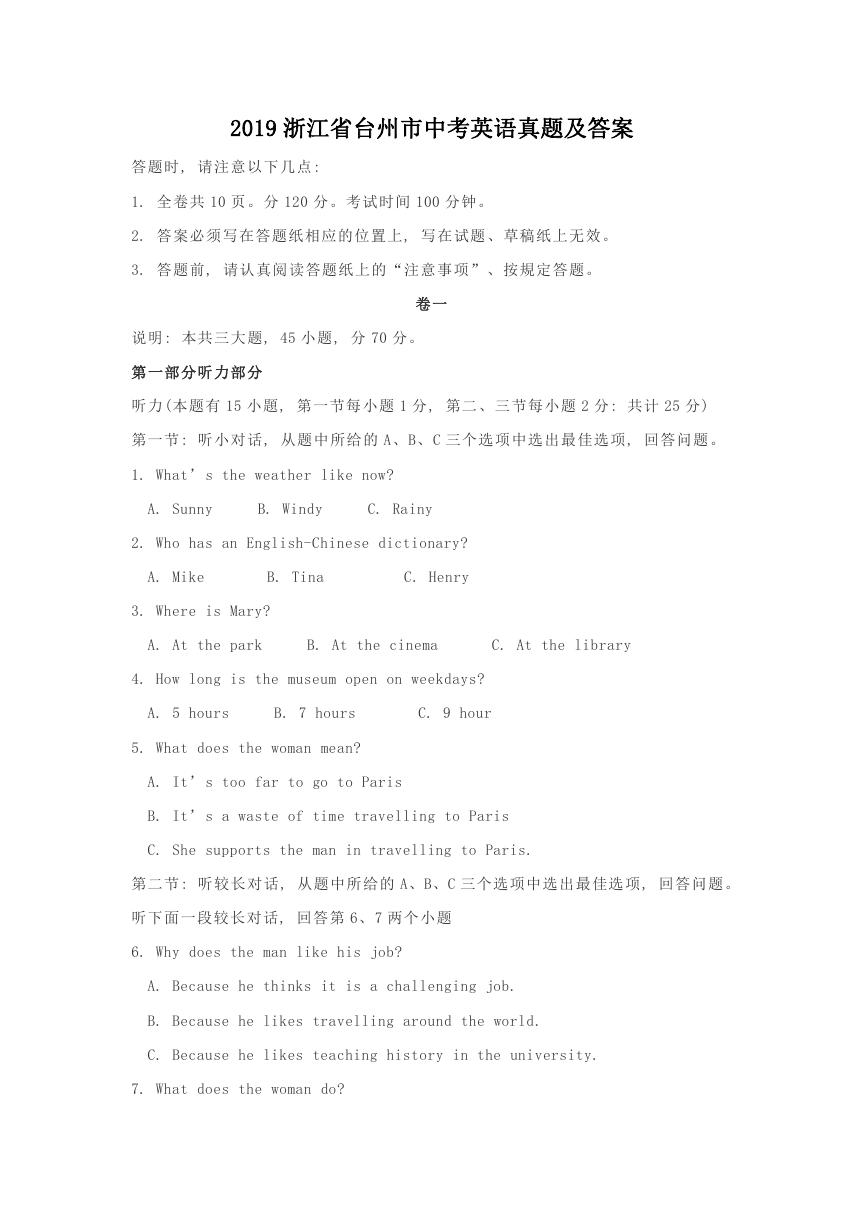

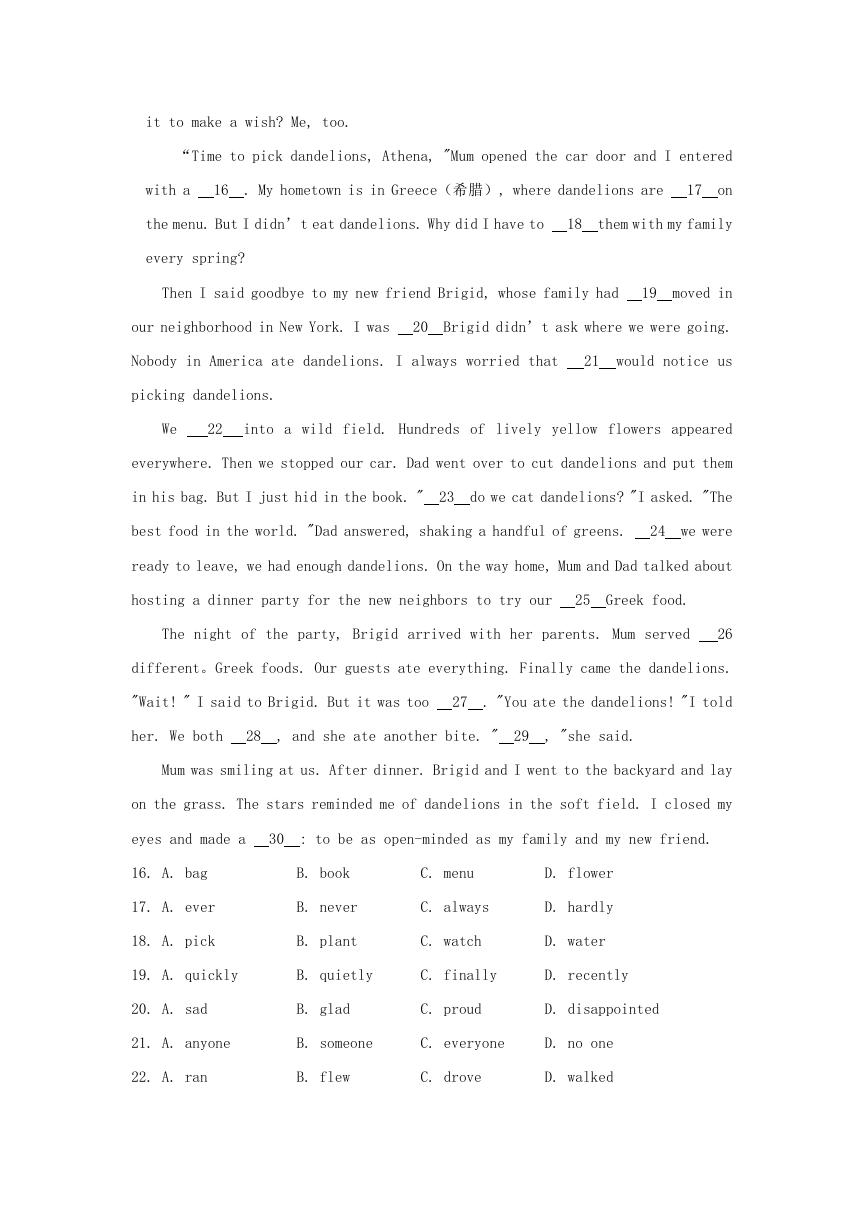
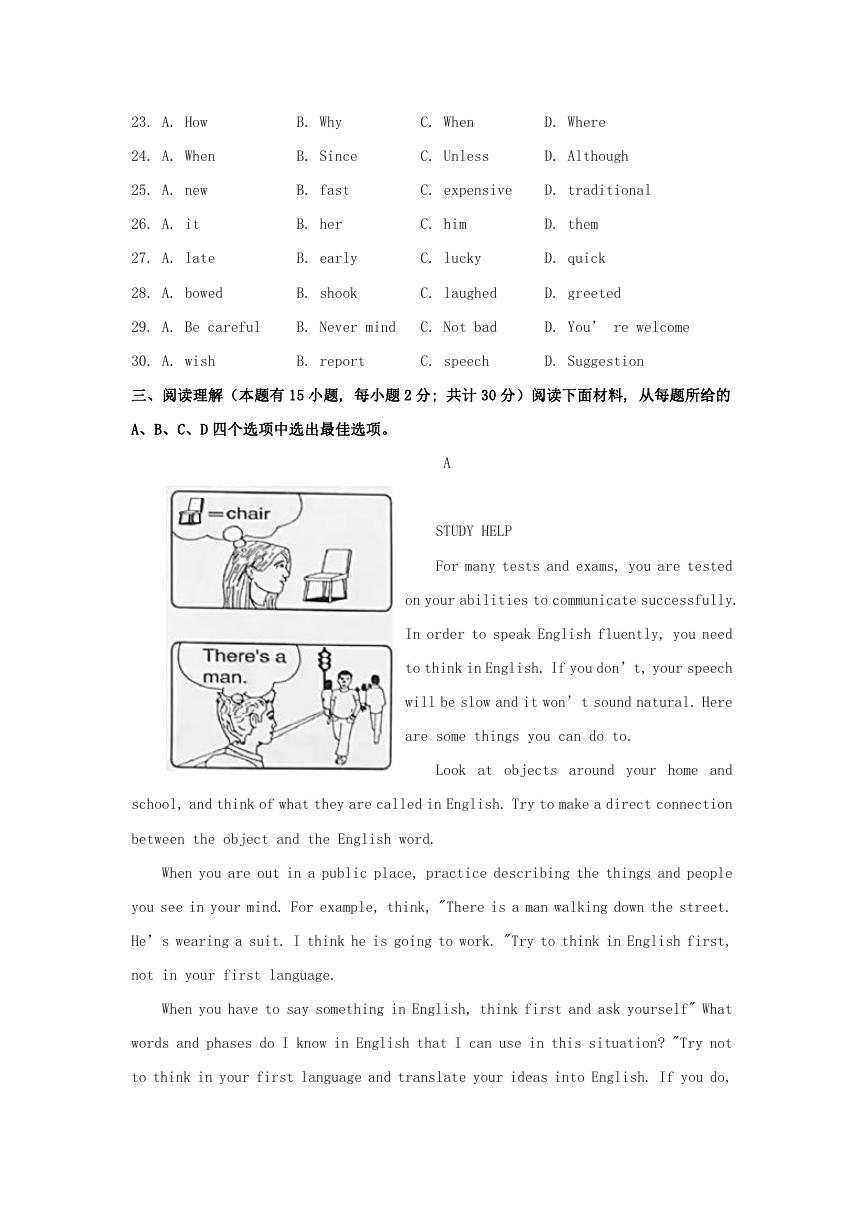

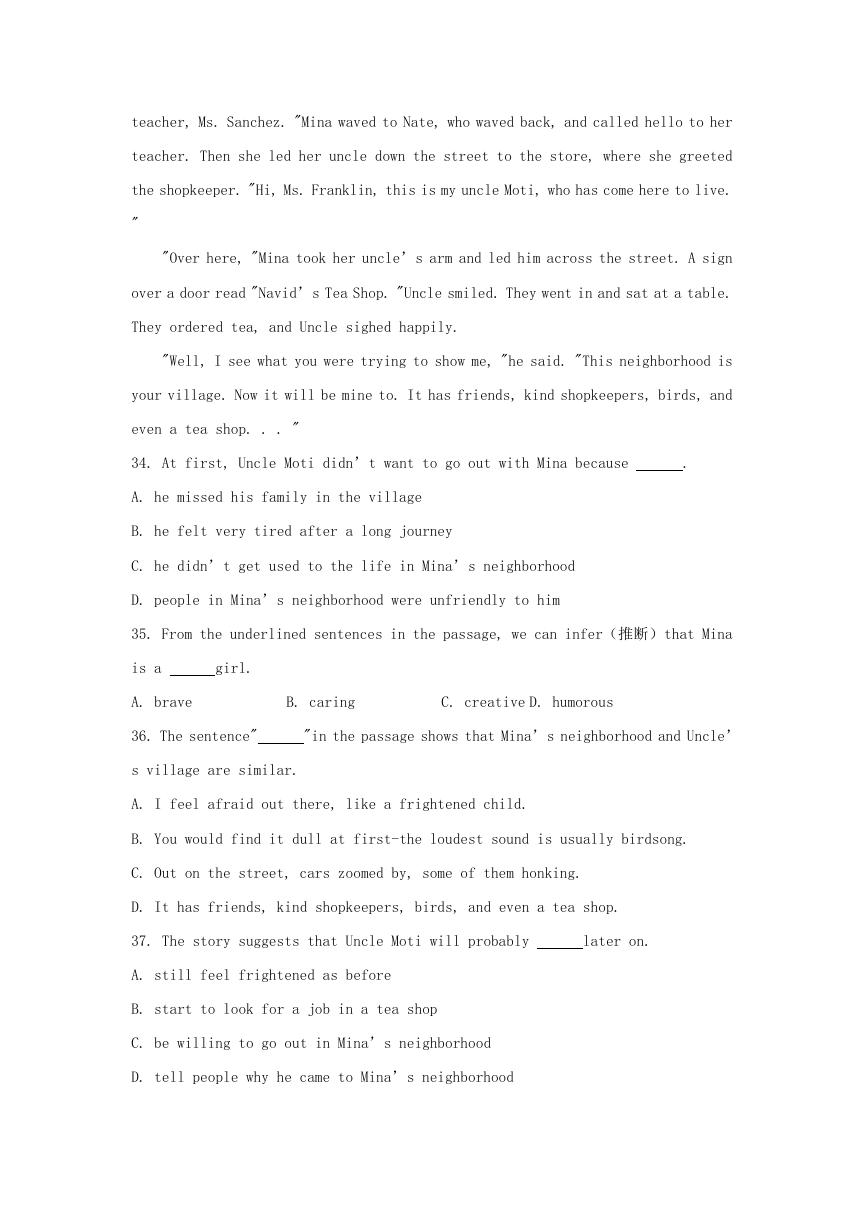
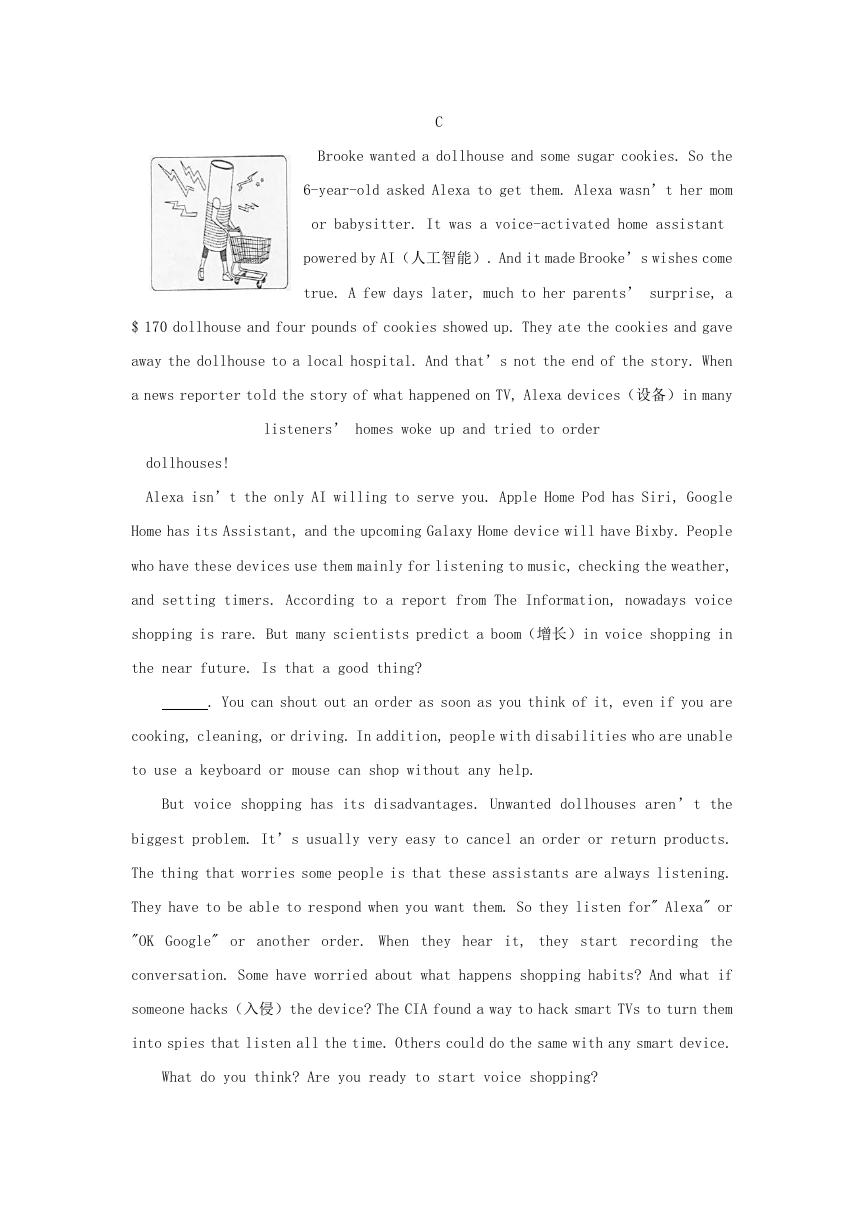
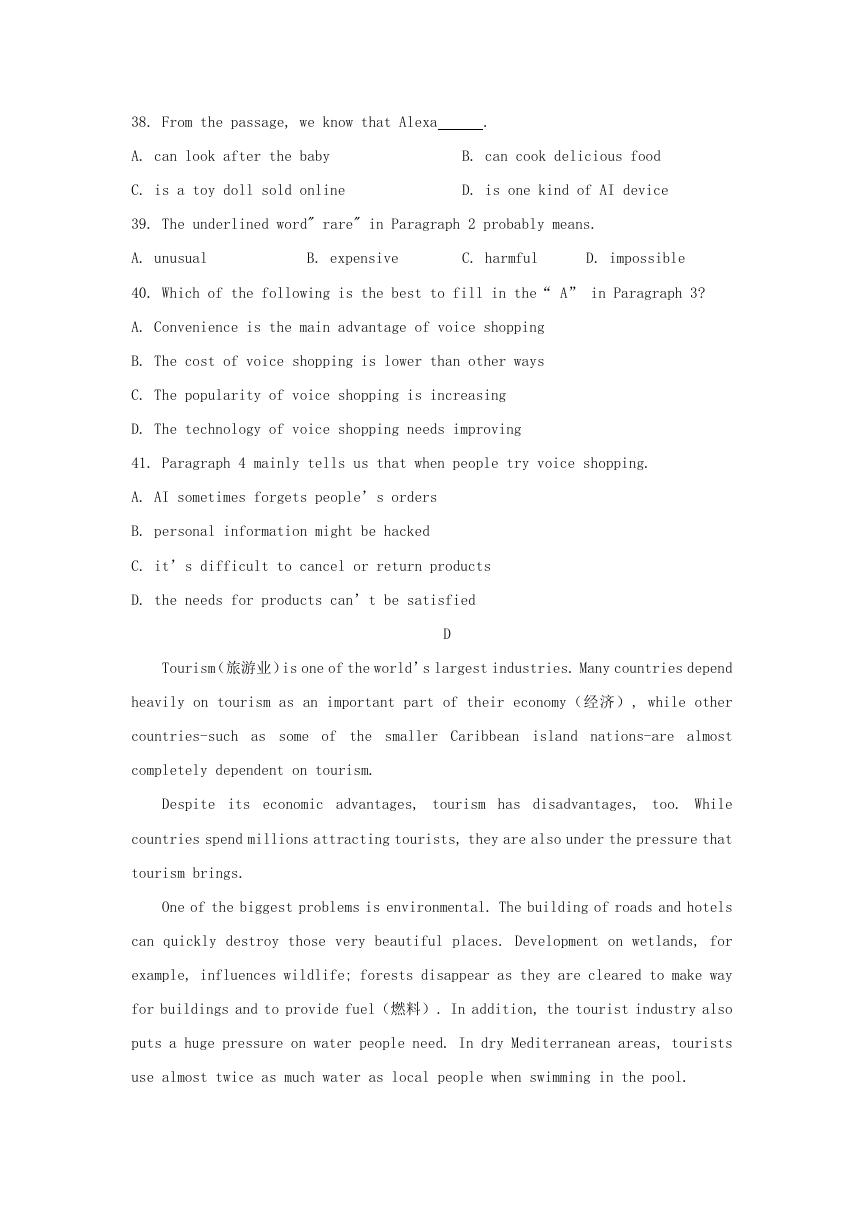








 2023年江西萍乡中考道德与法治真题及答案.doc
2023年江西萍乡中考道德与法治真题及答案.doc 2012年重庆南川中考生物真题及答案.doc
2012年重庆南川中考生物真题及答案.doc 2013年江西师范大学地理学综合及文艺理论基础考研真题.doc
2013年江西师范大学地理学综合及文艺理论基础考研真题.doc 2020年四川甘孜小升初语文真题及答案I卷.doc
2020年四川甘孜小升初语文真题及答案I卷.doc 2020年注册岩土工程师专业基础考试真题及答案.doc
2020年注册岩土工程师专业基础考试真题及答案.doc 2023-2024学年福建省厦门市九年级上学期数学月考试题及答案.doc
2023-2024学年福建省厦门市九年级上学期数学月考试题及答案.doc 2021-2022学年辽宁省沈阳市大东区九年级上学期语文期末试题及答案.doc
2021-2022学年辽宁省沈阳市大东区九年级上学期语文期末试题及答案.doc 2022-2023学年北京东城区初三第一学期物理期末试卷及答案.doc
2022-2023学年北京东城区初三第一学期物理期末试卷及答案.doc 2018上半年江西教师资格初中地理学科知识与教学能力真题及答案.doc
2018上半年江西教师资格初中地理学科知识与教学能力真题及答案.doc 2012年河北国家公务员申论考试真题及答案-省级.doc
2012年河北国家公务员申论考试真题及答案-省级.doc 2020-2021学年江苏省扬州市江都区邵樊片九年级上学期数学第一次质量检测试题及答案.doc
2020-2021学年江苏省扬州市江都区邵樊片九年级上学期数学第一次质量检测试题及答案.doc 2022下半年黑龙江教师资格证中学综合素质真题及答案.doc
2022下半年黑龙江教师资格证中学综合素质真题及答案.doc